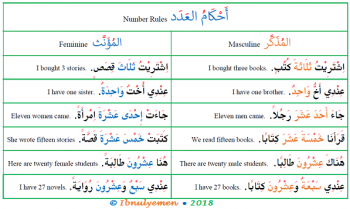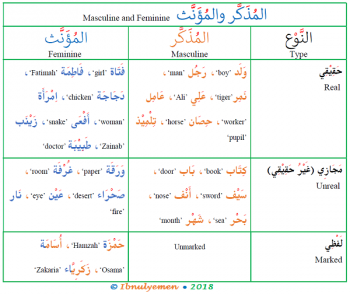Tag Archives: Gender
Arabic Number-gender Agreement and More Posted by Ibnulyemen اِبْنُ اليَمَن on Aug 16, 2018

As stated in the previous post, the agreement between the gender of the noun and the number that qualifies it is confusingly difficult for native speakers and learners of Arabic alike. This is especially true with cardinal numbers الأَعْدَاد الأَصْلِيَّة. With other number types, the agreement is straightforward and always requires the addition of the…
The Gender of Arabic Nouns (1) Posted by Ibnulyemen اِبْنُ اليَمَن on Jul 17, 2018

The gender الجِنْس of noun الاِسْم in Arabic is either masculine مُذَكَّر or feminine مُؤَّنَّث. The masculine المُذَكَّر is the basic form; therefore, it does not require a marker عَلاَمَة. The feminine المُؤَنَّث is derived from the masculine; it requires a feminine marker عَلَامَة تَأنِيْث. There are two types of masculine: real masculine and unreal…
The Verbal Sentence (Part 4) – Subject-Verb Agreement: Gender Posted by Fisal on Feb 3, 2013
Today we are going to continue our study of the Verbal Sentence الـجـمـلــة الـفـعـلـيـــة . We have already discussed the Verb in more detail and the Subject or doer of the verb. We have also started discussing the subject-verb agreement; how the verb looks like with different subjects. We started with the subject-verb agreement…
More notes on gender Posted by aziza on Sep 17, 2011
To add to my previous remarks about masculine and feminine, there are some words that refer to the same thing, and they have different gender, e.g. there are two words for window in Arabic: (نافذة) which is feminine and (شباك) which is masculine, likewise there are two words for life/living (حياة) which is feminine and…
Some notes on gender Posted by aziza on Sep 15, 2011
Learning the gender of words in Arabic is often tricky to non-native speakers, as there is not an easy rule that tells us whether a word is masculine or feminine, and many rules have exceptions. One of the most useful rules is that words that end in ta’ marbouta (ة) are feminine, e.g. سميرة, أميرة…
The use of plural relative pronouns Posted by aziza on Jul 8, 2011
In this post, I present the answer of the exercise on the dual relative pronouns and I also present a revision and some exercises on plural relative pronouns. First, here is the answer of the exercise and the translation of the sentences: 1- هذان هما الطالبان اللذان يدرسان في جامعتي. 2- تحدثت مع المهندستين اللتين…



